

5d.3 Veerle Van Den Eynden. Broadening the Impact of Your Research Through Your Data Management and Sharing Plan. By Andrew Creamer, Scientific Data Management Specialist An increasing number of private and publicly funded research sponsors require a data management plan (DMP) and/or sharing plan with submissions of proposals for funding.
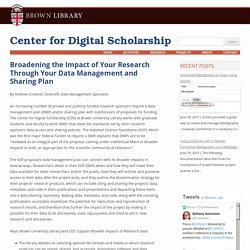
The Center for Digital Scholarship (CDS) at Brown University Library works with graduate students and faculty to write DMPs that meet the standards set by their research sponsors’ data access and sharing policies. The National Science Foundation (NSF), which was the first major federal funder to require a DMP, explains that DMPs are to be “reviewed as an integral part of the proposal, coming under Intellectual Merit or Broader Impacts or both, as appropriate for the scientific community of relevance.”
The NSF proposal’s data management plan can connect with its Broader Impacts in several ways. How to assist researchers in sharing their research data. Join research data librarians and leaders in developing library infrastructure and services, as well as Mendeley's research data expert, for insight into how to help researchers share their research data — from instruction and tools to motivating them with research data impact metrics.
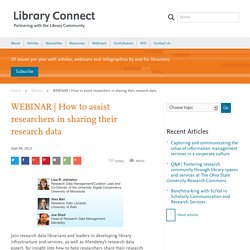
The scientific community is expanding its outlook on the data that comes out of research. As many funding bodies and governments begin to mandate that research data be made available, researchers are looking for ways to publish and share their data. Learn how librarians are playing an important role in these efforts by promoting data literacy, offering research data tools and services, and ensuring that data is not only published but discoverable. Webinar: Sharing research data so it really “counts” Librarians will reveal how they are helping researchers share data and motivating them with impact metrics By Colleen DeLory Posted on 14 October 2015 Most librarians are now aware of several great tools that can help their researchers meet funders’ mandates for managing and sharing their research data.
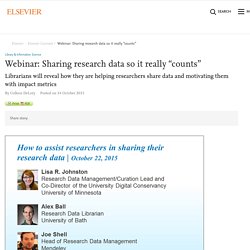
But to move beyond the letter of the law to the spirit of sharing, librarians must help ensure that data is not only published but discoverable. To participate in the webinar The webinar is on Thursday, October 22, from 11 a.m. to 12 p.m. Live tweeting Follow @Library_Connect and @ElsevierConnect on Twitter and use the hashtag #LCwebinar during the event for live conversations. Submitting questions for the panel Questions for the panel can be submitted through the webinar interface, or through Twitter using the hashtag #LCwebinar. Webinar topics include: The webinar is part of Elsevier's Library Connect program for academic, medical, corporate and government librarians. The presenters Lisa R. Sharing Output and Tracking Impact. How to Track the Impact of Research Data with Metrics. By Alex Ball (DCC), Monica Duke (DCC) Published: 29 June 2015 Browse the guide below or download the PDF.
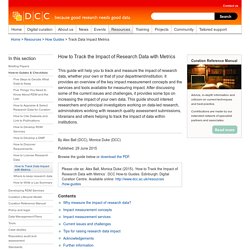
Please cite as: Alex Ball, Monica Duke (2015). Publishing and sharing your research data - Research Data Management - The University Library. Thinking how #opendata #impact on Government #GODAN. Publications on the impact of open data in the agricultural and nutrition sector – Knowledge Management for Agricultural and Rural Development (KM4ARD) The Open Definition makes precise the meaning of “open” with respect to knowledge, promoting a robust commons in which anyone may participate, and interoperability is maximized.
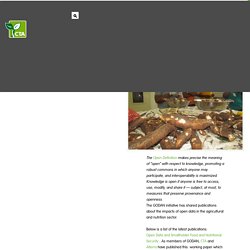
Knowledge is open if anyone is free to access, use, modify, and share it — subject, at most, to measures that preserve provenance and openness. Outcomes 2nd Workshop on Creating Impacts. Efficiency, sustainable and viable rural economy, and supportive governance are main impacts of open data in agriculture and nutrition On 10th and 11th of November, the Government of The Netherlands, Ministry of Economic Affairs hosted the 2nd International Workshop ‘Creating Impact with Open Data in Agriculture and Nutrition,’ which was well attended by about 75 representatives from government, private sector, research institutions and non-governmental organizations from mainly Europe and Africa.
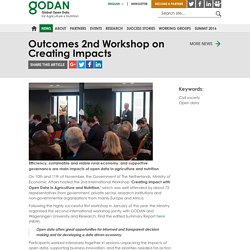
Following the highly successful first workshop in January of this year, the Ministry organised the second international workshop jointly with GODAN and Wageningen University and Research. Find the edited Summary Report here (NEW). 5d.3 Veerle Van Den Eynden. ODI GODAN paper 27 05 20152. 9.3 GODAN TheoryofChange narrativePUBLIC. Measuring success for open data. Measuring Open Data (February 2016 Hours) – Johns Hopkins Center for Government Excellence. Open Data Impacts: The research blog of @timdavies. How to Measure Open Data. One of the most frequent questions I get about open data is - why?
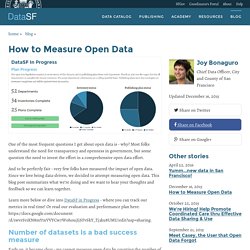
Most folks understand the need for transparency and openness in government, but some question the need to invest the effort in a comprehensive open data effort. And to be perfectly fair - very few folks have measured the impact of open data. Since we love being data-driven, we decided to attempt measuring open data. This blog post summarizes what we’re doing and we want to hear your thoughts and feedback so we can learn together. Learn more below or dive into DataSF in Progress - where you can track our metrics in real time! Number of datasets is a bad success measure Early on, it became clear - we cannot measure open data by counting the number of datasets. It incents the wrong behavior. Limited guidance and a focus on case studies. A new approach to measuring the impact of open data - Sunlight Foundation Blog. Strong evidence on the long-term impact of open data initiatives is incredibly scarce.
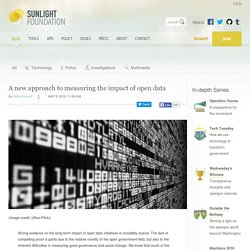
The lack of compelling proof is partly due to the relative novelty of the open government field, but also to the inherent difficulties in measuring good governance and social change. We know that much of the impact of policy advocacy, for instance, occurs even before a new law or policy is introduced, and is thus incredibly difficult to evaluate. At the same time, it is also very hard to detect the causality between a direct change in the legal environment and the specific activities of a policy advocacy group. Attribution is equally challenging when it comes to assessing behavioral changes – who gets to take credit for increased political engagement and greater participation in democratic processes?